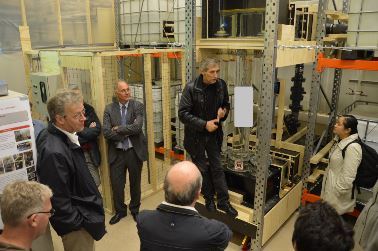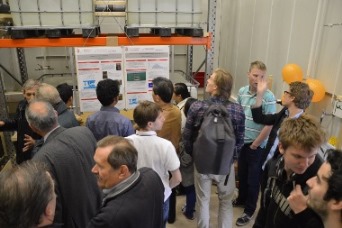Ocean Grazer Open Day: scale prototype of novel wave energy converter demonstrated
Thursday, 5 June 2014, Groningen – Researchers of the Ocean Grazer Group, led by project manager drs. W.A. Prins of the Advanced Production Engineering group, organized an “open house” to inform visitors about the recently started Ocean Grazer project. The Ocean Grazer is a novel concept for extracting ocean energy (wave, wind, solar etc.) which is highly adaptable and therefore very efficient and capable of offering a significant amount of loss-free energy storage. During the “open house” event, visitors could witness a demonstration of the working prototype and were informed about the concept of the Ocean Grazer, the research currently being performed by undergraduate and graduate students of the Advanced Production Engineering and Discrete Technology & Production Automation groups of the Institute for Technology & Management, as well as the future plans of the Ocean Grazer project.
This event was attended by drs. J. de Jeu, vice-chairman of the Board of the University, prof.dr. J. Knoester and dr. D. Veldhuis of the Board of the Faculty of Mathematics & Natural Sciences (FMNS), and a number of staff and students from the FMNS.


More news
-
29 January 2026
Microplastic research - media hype or real danger?
-
27 January 2026
ERC Proof of Concept grant for Maria Loi
